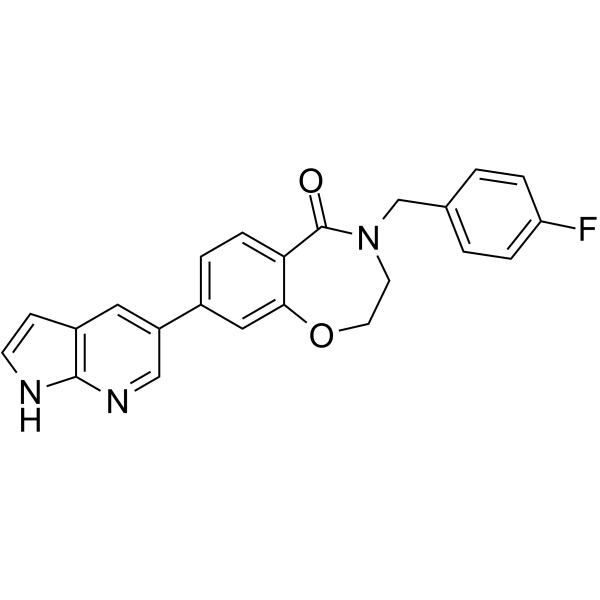| Description |
TNIK-IN-3 is a potent, selective and orally active inhibitor of Traf2- and Nck-interacting protein kinase (TNIK), with an IC50 of 0.026 μM. TNIK-IN-3 could also inhibit Flt4 (IC50=0.030 μM), Flt1 (IC50=0.191 μM) and DRAK1 (IC50=0.411 μM). TNIK-IN-3 can be used for the research of colorectal cancer[1].
|
| Related Catalog |
|
| Target |
IC50: 0.026 μM (TNIK)[1], 0.030 μM (Flt4)[1], 0.191 μM (Flt1)[1], 0.411 μM (DRAK1)[1]
|
| In Vitro |
TNIK-IN-3 (compound 21k) inhibits Aurora-A, GCK, and MLK3 with IC50s of 0.517 μM, 3.657 μM, and 4.552 μM, respectively[1]. TNIK-IN-3 (0.1-100 μM; 3 days) inhibits the viability of HCT116 and DLD-1 cells, with IC50s of 4.26 μM and 8.00 μM, respectively[1]. TNIK-IN-3 (2.5-40 μM; 10 days) dose-dependently inhibits the colony formation of HCT116 and DLD-1 cells[1]. TNIK-IN-3 (5-20 μM; 48 h) inhibits the migration of HCT116 and DLD-1 cells[1]. TNIK-IN-3 (5-40 μM; 48 h) dose-dependently inhibits the expression ofLRP5 and LRP6 proteins, Wnt target genes AXIN2 and c-Myc in HCT116 cells[1]. TNIK-IN-3 (5-20 μM; 48 h) significantly suppresses the phosphorylation of JNK1/2 in Hela cells[1]. Cell Viability Assay[1] Cell Line: HCT116 and DLD-1 cells Concentration: 0.1-100 μM Incubation Time: 3 days Result: Inhibited cell viability in a dose-dependent manner. Cell Viability Assay[1] Cell Line: HCT116 cells Concentration: 5, 10, 20, 40 μM Incubation Time: 48 hours Result: Inhibited the expression of Wnt target genes AXIN2 and c-Myc, LRP5 and LRP6 proteins.
|
| In Vivo |
TNIK-IN-3 (compound 21k) (100-150 mg/kg; p.o. twice daily for 18 days) inhibits tumor growth in a dose-dependent manner[1]. Animal Model: Six-week-old female NOD-SCID mice were injected with HCT116 cells[1] Dosage: 100, 150 mg/kg Administration: P.o. twice daily for 18 days Result: Significantly inhibited tumor growth at a dose of 150 mg/kg. No obvious weight loss and no other side effects were observed.
|
| References |
[1]. Li Y, et, al. Discovery of 3,4-Dihydrobenzo[ f][1,4]oxazepin-5(2 H)-one Derivatives as a New Class of Selective TNIK Inhibitors and Evaluation of Their Anti-Colorectal Cancer Effects. J Med Chem. 2022 Jan 5.
|
